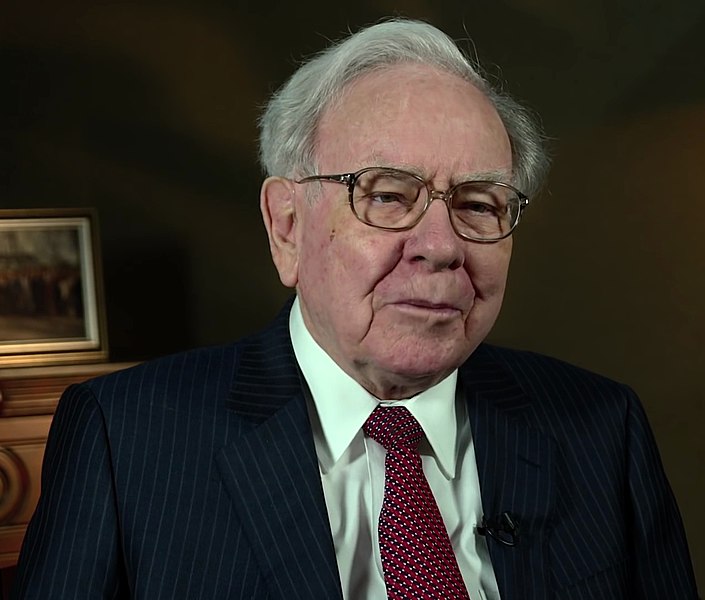Unveiling the Buffett Blueprint: Timeless Leadership Lessons for Success

Embarking on the Warren Buffett Leadership Journey
Warren Buffett, known as the Oracle of Omaha, is a name synonymous with success, wisdom, and remarkable leadership. As the chairman and CEO of Berkshire Hathaway, he has navigated the tumultuous waters of the financial world for decades, amassing a fortune that places him among the world’s wealthiest individuals. However, it is not just his wealth that makes Buffett a titan of industry; it is his unique approach to leadership and his unwavering dedication to his principles that have captured the attention and admiration of people around the world. This article aims to delve into the life and career of Warren Buffett, exploring the key leadership lessons and stories that have shaped his enduring legacy.
To understand the essence of Buffett’s leadership style, it is important to examine his humble beginnings. Born in Omaha, Nebraska, in 1930, Buffett was introduced to the world of finance at a young age through his father, a stockbroker turned Congressman. As a child, he displayed an early aptitude for numbers and an entrepreneurial spirit, selling chewing gum, Coca-Cola, and even golf balls to make extra money. He purchased his first stock at the age of 11 and went on to study at the Wharton School of Business and later at Columbia University, where he became a disciple of Benjamin Graham, the father of value investing. Graham’s teachings became the cornerstone of Buffett’s investment philosophy, and his influence can still be seen in the Oracle’s approach to leadership and decision-making today.
Buffett’s leadership style is often described as a blend of modesty, candor, and a relentless pursuit of knowledge. He is known for his ability to break down complex financial concepts into simple terms, making them accessible to people from all walks of life. Through this approach, he has been able to inspire trust and confidence in his followers, as well as the countless investors who have placed their faith in his guidance.
One of the defining characteristics of Buffett’s leadership is his unwavering commitment to ethical behavior and the importance he places on integrity. This is evident in how he has navigated various crises throughout his career, always prioritizing the long-term well-being of his company and its stakeholders over short-term gains. Additionally, Buffett has demonstrated a genuine concern for the people who work for him, creating a decentralized organizational structure that fosters trust, autonomy, and personal accountability.
In this article, we will explore some of the most significant leadership lessons and stories from Warren Buffett’s illustrious career, including his approach to integrity, simplicity, lifelong learning, humility, empathy, company culture, long-term thinking, philanthropy, and mentorship. By examining these aspects of his leadership, we hope to shed light on the qualities that have made Buffett not only a financial genius but also a role model for aspiring leaders across industries and generations.
Embracing the Value of Integrity
Integrity serves as a cornerstone in Warren Buffett’s leadership approach, guiding both his personal and professional decisions. The Oracle of Omaha has consistently demonstrated that ethical behavior and transparency are not only morally correct but also crucial for long-term business success. The Salomon Brothers incident, one of the most defining moments in Buffett’s career, illustrates his unwavering commitment to integrity and the lessons that leaders can glean from his response.
The Salomon Brothers Incident
In 1991, Salomon Brothers, one of the largest investment banks at the time, became embroiled in a major scandal involving the manipulation of U.S. Treasury auctions. As a result, the firm faced the risk of losing its license to operate as a primary dealer, which could have led to its collapse. At the time, Berkshire Hathaway held a significant stake in Salomon Brothers, and Buffett was asked to step in as the interim chairman to salvage the company’s reputation and steer it through the crisis.
Warren Buffett’s Response
Buffett’s actions during the Salomon Brothers crisis demonstrate the power of ethical leadership in the face of adversity. He quickly took charge, addressing the misconduct head-on and setting a clear tone of zero tolerance for unethical behavior. Buffett worked tirelessly to regain the trust of regulators, shareholders, and the public by cooperating with authorities, ensuring that the responsible individuals faced consequences, and implementing comprehensive internal controls to prevent future misconduct.
In his testimony before the U.S. Congress, Buffett made a statement that has become emblematic of his approach to integrity: “Lose money for the firm, and I will be understanding. Lose a shred of reputation for the firm, and I will be ruthless.” This powerful message demonstrated his unwavering commitment to ethical behavior and the paramount importance of reputation in business.
Lessons on Accountability and Ethical Leadership
The Salomon Brothers incident offers several important leadership lessons that remain relevant today:
-
Lead by example: Buffett’s decisive actions during the crisis underscore the importance of leading by example in times of adversity. By addressing the issue head-on and holding himself and others accountable, he set a high standard for ethical conduct within the organization.
-
Prioritize reputation over short-term gains: Buffett’s emphasis on the importance of reputation serves as a reminder that long-term business success relies on maintaining trust and credibility with stakeholders. Unethical behavior might offer short-term gains, but it ultimately undermines the foundation of any organization.
-
Foster a culture of integrity: The incident highlights the need for leaders to create a culture that promotes ethical behavior and encourages employees to speak up when they witness wrongdoing. Implementing strong internal controls and fostering open communication channels are essential to ensuring that organizations operate with integrity.
-
Embrace transparency: Buffett’s transparent approach to dealing with the scandal and his cooperation with regulators helped restore the firm’s credibility. By being open and honest about the situation, leaders can rebuild trust and demonstrate their commitment to rectifying past mistakes.
By embracing the value of integrity and incorporating these lessons into their leadership approach, business leaders can create a strong ethical foundation that fosters trust, promotes long-term success, and leaves a lasting, positive impact on their organizations.
The Power of Simplicity
One of the hallmarks of Warren Buffett’s leadership style is his ability to distill complex concepts into easily understandable ideas. His preference for simplicity extends to his investment philosophy, decision-making process, and communication style, enabling him to connect with people from all walks of life. This section delves into the power of simplicity in leadership, focusing on Buffett’s investment approach, the “Circle of Competence” concept, and how leaders can apply simplicity to enhance their decision-making.
Buffett’s Investment Philosophy
Warren Buffett is renowned for his value investing approach, which he honed under the mentorship of Benjamin Graham. In essence, value investing is the practice of buying undervalued stocks with strong fundamentals and holding onto them for the long term. Buffett’s investment philosophy emphasizes a few key principles: understanding the underlying business, focusing on long-term value, and maintaining a margin of safety. These principles can be applied to leadership as well, guiding decision-making and fostering a culture of thoughtful, deliberate action.
The “Circle of Competence” Concept
A crucial aspect of Buffett’s investment philosophy is the “Circle of Competence” concept, which encourages investors to focus on industries and businesses they truly understand. By doing so, they can make better-informed decisions and avoid being swayed by market noise or trends that fall outside their areas of expertise. Buffett himself has been known to pass up on investment opportunities in industries he does not fully comprehend, preferring to stick to what he knows best.
The “Circle of Competence” concept can be applied to leadership in various ways:
-
Know your strengths and limitations: Leaders should understand their areas of expertise and work to strengthen them while also recognizing their limitations. By doing so, they can make better decisions and delegate tasks to team members with complementary skills.
-
Encourage specialization: By fostering a culture that values specialization, leaders can create an environment where individuals focus on their core competencies, leading to higher overall performance and more informed decision-making.
-
Seek learning opportunities: While it is essential to focus on one’s areas of competence, leaders should also strive to expand their knowledge and understanding of other fields. This continuous learning enables them to make more informed decisions and adapt to new challenges.
Applying Simplicity to Decision-making in Leadership
Simplicity can be a powerful tool in leadership, particularly in decision-making. By adopting a simple, focused approach, leaders can more effectively tackle complex problems and communicate their vision to their teams. Here are some ways leaders can incorporate simplicity into their decision-making process:
-
Break down complex issues: When faced with complex problems, leaders can break them down into smaller, more manageable components. This allows for a clearer understanding of the issue and facilitates more effective decision-making.
-
Focus on key objectives: Rather than being overwhelmed by numerous competing priorities, leaders should focus on the most critical objectives and work towards achieving them. This helps to maintain clarity and direction, ensuring that resources are allocated effectively.
-
Communicate clearly and concisely: Effective communication is crucial in leadership, and simplicity plays a vital role in this regard. By articulating their thoughts and plans in a simple, straightforward manner, leaders can ensure that their teams understand and align with their vision.
By embracing the power of simplicity, leaders can make better decisions, foster a culture of clarity and focus, and more effectively navigate the complexities of the modern business landscape.
Lifelong Learning and Intellectual Curiosity
Warren Buffett’s insatiable appetite for knowledge has played a pivotal role in his success as an investor and leader. His commitment to lifelong learning and intellectual curiosity not only keeps him informed and adaptable but also fosters a culture of continuous improvement within his organization. In this section, we will explore Buffett’s reading habits, his willingness to embrace change and adapt to new industries, and how leaders can encourage a culture of learning within their own organizations.
Buffett’s Reading Habits
Buffett is a voracious reader, reportedly spending up to 80% of his day reading newspapers, financial reports, and books. He credits his extensive reading habit as a key factor in his success, stating, “I just sit in my office and read all day.” Buffett’s reading list includes a diverse array of topics, from biographies and history to business and economics, reflecting his wide-ranging interests and commitment to expanding his knowledge.
By dedicating time each day to reading and learning, Buffett has honed his ability to identify trends, spot opportunities, and make well-informed decisions. His reading habit also helps him stay curious and open to new ideas, allowing him to adapt and thrive in an ever-changing business landscape.
Embracing Change and Adapting to New Industries
Despite his preference for traditional industries, Buffett has demonstrated a willingness to adapt and invest in new sectors as they emerge. For example, after initially avoiding technology stocks, he eventually recognized the value in companies like Apple and IBM, making significant investments in both.
Buffett’s ability to embrace change and adapt to new industries is a testament to his intellectual curiosity and commitment to lifelong learning. It also highlights the importance of staying informed and open to new ideas, even if they fall outside one’s traditional areas of expertise.
Encouraging a Culture of Learning within an Organization
Leaders can learn from Buffett’s example by fostering a culture of learning within their own organizations. By promoting intellectual curiosity and continuous improvement, leaders can empower their teams to grow, adapt, and innovate. Here are some ways to encourage a culture of learning:
-
Lead by example: Leaders should model their commitment to learning by reading, attending conferences, and engaging in professional development. This sends a powerful message to the team about the importance of continuous improvement.
-
Provide opportunities for growth: Offer employees access to training, workshops, and mentorship programs to help them develop new skills and expand their knowledge.
-
Encourage knowledge sharing: Create an environment where employees feel comfortable sharing their expertise and insights with their colleagues. This can be achieved through regular team meetings, informal discussions, or internal seminars.
-
Recognize and reward learning: Acknowledge employees who demonstrate a commitment to learning and growth, and reward them for their efforts. This can be done through promotions, bonuses, or public recognition.
-
Foster a curious mindset: Encourage employees to ask questions, challenge assumptions, and explore new ideas. By promoting curiosity, leaders can help their teams stay adaptable and innovative in the face of change.
By cultivating a culture of lifelong learning and intellectual curiosity, leaders can equip their organizations to thrive in an increasingly complex and competitive business environment. Moreover, they can inspire their teams to grow, innovate, and reach their full potential.
Humility and Empathy in Leadership
Warren Buffett’s humility and empathy set him apart as a leader and have played a vital role in his long-term success. Despite his extraordinary wealth and influence, he remains grounded, approachable, and deeply committed to understanding the needs and perspectives of others. This section will explore Buffett’s modest lifestyle, his ability to listen and value others’ opinions, and the role of empathy in building strong relationships.
Buffett’s Modest Lifestyle
One of the most striking aspects of Warren Buffett’s life is his relatively modest lifestyle. He still resides in the Omaha home he purchased in 1958 for $31,500 and has a penchant for McDonald’s and Cherry Coke. This frugality sends a powerful message to his employees, shareholders, and the public about his values and priorities. It demonstrates that he is focused on long-term wealth creation rather than short-term extravagance, and it fosters trust in his leadership.
Listening to and Valuing Others’ Opinions
Buffett is known for his ability to listen carefully and consider the opinions of others, even if they differ from his own. He has often been quoted as saying, “It’s better to hang out with people better than you. Pick out associates whose behavior is better than yours, and you’ll drift in that direction.” This approach reflects his belief in the power of collaboration and the value of diverse perspectives in decision-making.
By actively listening to others and valuing their input, Buffett is able to make more informed decisions and foster a culture of inclusion and mutual respect. This approach not only strengthens the decision-making process but also helps build strong relationships with employees, shareholders, and business partners.
The Role of Empathy in Building Strong Relationships
Empathy is the ability to understand and share the feelings of others, and it plays a critical role in effective leadership. Buffett’s empathetic nature is evident in the way he communicates with his shareholders, employees, and the public. He is known for his candid and relatable communication style, often using stories and analogies to convey complex financial concepts in a way that resonates with a broad audience.
Buffett’s empathy also extends to his employees and the communities in which his businesses operate. He has a history of empowering his managers to run their own businesses autonomously while providing support and guidance when needed. This approach demonstrates his trust in their capabilities and his understanding of their unique challenges and needs.
By incorporating humility and empathy into their leadership approach, leaders can:
-
Build strong relationships: Empathetic leaders are better equipped to understand the needs and perspectives of their employees, shareholders, and business partners, which fosters stronger connections and collaboration.
-
Encourage open communication: A humble and empathetic leader creates an environment where people feel comfortable expressing their thoughts and opinions, which can lead to more informed decision-making and a more inclusive culture.
-
Inspire trust and loyalty: When leaders demonstrate humility and empathy, they are more likely to gain the trust and loyalty of their team members, who feel valued and respected.
-
Enhance adaptability and resilience: Empathetic leaders are more in tune with the needs and concerns of their team members and stakeholders, which allows them to adapt more effectively in times of change or adversity.
By embracing humility and empathy, leaders can foster stronger relationships, build trust, and create a more inclusive, resilient organization that is better equipped to navigate the challenges of an ever-changing business landscape.
The Art of Delegation and Empowering Others
Warren Buffett’s approach to delegation and empowering others has been a key driver of his success as a leader and investor. By entrusting his managers and employees with significant autonomy and responsibility, he creates an environment where individuals can thrive and drive their businesses forward. This section will explore Buffett’s philosophy on delegation, the benefits of empowering others, and how leaders can effectively implement these principles within their organizations.
Buffett’s Philosophy on Delegation
Buffett is renowned for his hands-off approach to management, often referred to as “delegation on steroids.” He is known for entrusting his managers with a high degree of autonomy, allowing them to run their respective businesses as they see fit. Buffett believes in hiring capable, trustworthy individuals and providing them with the support and resources they need to succeed, without micromanaging their every decision.
This approach is based on Buffett’s conviction that individuals perform best when they are given the freedom to apply their skills, experience, and judgement, rather than being stifled by excessive oversight or bureaucracy. It also reflects his belief in the importance of trust and accountability in building strong, successful organizations.
The Benefits of Empowering Others
Buffett’s approach to delegation and empowerment offers numerous benefits for leaders and organizations:
-
Increased employee engagement: Empowered employees are more likely to be engaged, motivated, and committed to their work, which can lead to higher productivity and performance.
-
Enhanced innovation and creativity: When individuals are given the freedom to make decisions and take risks, they are more likely to explore new ideas and develop innovative solutions to problems.
-
Faster decision-making: By decentralizing decision-making, organizations can respond more quickly to changing market conditions and capitalize on emerging opportunities.
-
Stronger talent retention and attraction: Empowered employees are more likely to feel valued and respected, which can help retain top talent and attract new hires who are seeking challenging, rewarding roles.
Implementing Delegation and Empowerment within an Organization
To effectively implement delegation and empowerment within their organizations, leaders can adopt the following strategies:
-
Hire capable, trustworthy individuals: To delegate effectively, leaders must first identify and hire individuals who possess the skills, experience, and integrity necessary to excel in their roles.
-
Set clear expectations: Leaders should clearly communicate their expectations and goals to their employees, providing them with the direction and guidance they need to succeed.
-
Provide support and resources: While delegating responsibility is essential, leaders must also ensure that their employees have access to the resources and support they need to excel in their roles. This may include training, mentorship, and ongoing feedback.
-
Foster a culture of trust and accountability: Empowerment is most effective when it is accompanied by a culture of trust and accountability. Leaders should demonstrate their trust in their employees by giving them the autonomy to make decisions while also holding them accountable for their actions.
-
Encourage open communication: To maintain a balance between delegation and oversight, leaders should encourage open communication with their employees, providing them with regular opportunities to discuss their progress, challenges, and ideas.
By embracing the art of delegation and empowering others, leaders can create a dynamic, thriving work environment that fosters employee engagement, innovation, and long-term success. In doing so, they can follow in Warren Buffett’s footsteps and build organizations that are not only financially successful but also grounded in trust, respect, and collaboration.
The Importance of Ethical Leadership and Long-Term Thinking
Warren Buffett’s emphasis on ethical leadership and long-term thinking has played a crucial role in his success and enduring reputation. He has consistently demonstrated the importance of adhering to strong moral principles and focusing on the long-term implications of business decisions, rather than chasing short-term gains. This section will explore the key aspects of ethical leadership, Buffett’s commitment to long-term thinking, and how leaders can integrate these principles into their own leadership style.
Ethical Leadership
Ethical leadership involves making decisions and taking actions based on a strong foundation of moral principles and values. Buffett’s approach to ethical leadership is best encapsulated in his famous quote, “It takes 20 years to build a reputation and five minutes to ruin it. If you think about that, you’ll do things differently.” He has consistently prioritized ethical considerations in his investment decisions, avoiding companies with dubious practices or questionable business models.
By adhering to strong ethical principles, Buffett has built a reputation for integrity and trustworthiness, which has not only contributed to his personal success but also the success of his investments and the businesses under the Berkshire Hathaway umbrella.
Long-Term Thinking
Warren Buffett’s long-term investment approach is another hallmark of his leadership style. He is known for his patience and discipline in holding onto investments, often for decades, to allow their intrinsic value to be realized. This long-term focus also extends to his approach to business strategy and decision-making, emphasizing the importance of considering the long-term implications of actions and prioritizing sustainable growth over short-term gains.
Long-term thinking offers several benefits for leaders and organizations:
-
Improved decision-making: By considering the long-term implications of their decisions, leaders can make more informed choices that contribute to the overall success and sustainability of their organization.
-
Enhanced resilience: Organizations that focus on long-term growth are often better equipped to navigate challenges and adapt to changing market conditions, which can contribute to their overall resilience and success.
-
Stronger stakeholder relationships: A long-term focus helps build trust and credibility with employees, shareholders, and business partners, fostering stronger relationships and a more stable foundation for growth.
Integrating Ethical Leadership and Long-Term Thinking into Leadership Styles
Leaders can learn from Warren Buffett’s example by integrating ethical leadership and long-term thinking into their own leadership styles. Here are some strategies for doing so:
-
Develop a strong set of core values: Leaders should define their core values and principles, which will serve as the foundation for their decision-making and actions.
-
Lead by example: By demonstrating a commitment to ethical behavior and long-term thinking in their own actions, leaders can set a positive example for their teams and encourage similar behavior throughout the organization.
-
Encourage transparency and accountability: Foster a culture of openness and honesty, where employees are encouraged to voice their concerns and hold themselves and their peers accountable for their actions.
-
Prioritize long-term goals: When making decisions, leaders should consider the long-term implications and prioritize actions that contribute to the organization’s long-term success and sustainability.
-
Communicate the importance of ethics and long-term thinking: Regularly discuss and reinforce the importance of ethical behavior and long-term thinking with employees, shareholders, and other stakeholders.
By embracing ethical leadership and long-term thinking, leaders can create organizations that are not only financially successful but also grounded in strong moral principles and values. This approach can contribute to the long-term success and sustainability of an organization, as well as the personal success and reputation of its leaders.
Giving Back: Philanthropy and Social Responsibility
Warren Buffett’s commitment to philanthropy and social responsibility has had a profound impact on his personal legacy and the world at large. His belief in using his wealth to address pressing societal issues and improve the lives of others serves as a powerful example for leaders seeking to make a positive impact beyond their organizations. In this section, we will discuss The Giving Pledge, Buffett’s views on wealth and social responsibility, and how leaders can integrate philanthropy and social responsibility into their leadership approach.
The Giving Pledge
In 2010, Warren Buffett, along with Bill and Melinda Gates, launched The Giving Pledge, an initiative encouraging billionaires to commit to giving away at least half of their wealth to philanthropic causes during their lifetime or in their will. The Pledge has since attracted over 200 signatories from around the world, representing a collective commitment of hundreds of billions of dollars toward addressing global challenges.
Buffett’s own philanthropic commitments are significant. He has pledged to give away 99% of his wealth, with the majority going to the Bill & Melinda Gates Foundation, which focuses on global health, education, and poverty alleviation. This extraordinary commitment reflects Buffett’s belief in the power of philanthropy to create lasting, positive change in the world.
Buffett’s Views on Wealth and Social Responsibility
Warren Buffett’s views on wealth and social responsibility are rooted in the idea that those who have accumulated significant wealth have a moral obligation to use it for the betterment of society. He has often spoken about the role of luck in his own success, acknowledging that his wealth is largely a product of being born at the right time and in the right place.
This perspective has shaped Buffett’s approach to philanthropy, inspiring him to use his resources to address systemic challenges and create opportunities for those who are less fortunate. By doing so, he seeks to level the playing field and contribute to a more equitable, just world.
Integrating Philanthropy and Social Responsibility into Leadership
Leaders can learn from Buffett’s example by integrating philanthropy and social responsibility into their leadership approach. Here are some strategies to consider:
-
Align philanthropy with core values: Identify the causes and issues that resonate with your personal values and the values of your organization, and focus your philanthropic efforts in these areas.
-
Leverage resources and expertise: Utilize your organization’s unique resources, expertise, and networks to maximize the impact of your philanthropic initiatives.
-
Encourage employee involvement: Create opportunities for employees to engage in philanthropic activities, such as volunteer programs, donation matching, or paid time off for volunteering. This not only supports your organization’s social responsibility efforts but also fosters a sense of purpose and engagement among your workforce.
-
Promote transparency and accountability: Share your organization’s philanthropic goals, initiatives, and progress with employees, shareholders, and other stakeholders. This promotes transparency and holds your organization accountable for its social responsibility commitments.
-
Collaborate with other organizations: Forge partnerships with other businesses, nonprofits, and community organizations to amplify the impact of your philanthropic initiatives and create lasting, systemic change.
By embracing philanthropy and social responsibility, leaders can create a positive impact beyond their organizations, addressing societal challenges and improving the lives of others. In doing so, they can contribute to a more equitable, sustainable world and leave a lasting legacy that transcends their professional achievements.
Mentoring the Next Generation
Warren Buffett’s commitment to mentoring the next generation of leaders is an important aspect of his leadership approach. By sharing his knowledge, insights, and experiences with his successors and other aspiring leaders, he has helped shape the future of the business world and ensured the continuity of his values and principles. In this section, we will explore Buffett’s relationship with his successors, the role of mentorship in developing future leaders, and how leaders can identify and nurture potential leaders within their organizations.
Buffett’s Relationship with His Successors
Warren Buffett has been intentional about grooming and mentoring his potential successors within Berkshire Hathaway. As he has aged, he has gradually delegated more responsibilities to key executives, such as Ajit Jain and Greg Abel, who have been identified as potential successors. Buffett’s approach to mentoring has involved providing guidance, support, and opportunities for growth while allowing these executives to take on significant responsibilities and make important decisions autonomously.
This hands-on yet empowering approach has allowed Buffett’s potential successors to develop their skills and experience under his tutelage, preparing them to lead Berkshire Hathaway into the future while preserving the organization’s unique culture and values.
The Role of Mentorship in Developing Future Leaders
Mentorship plays a critical role in the development of future leaders by providing them with the knowledge, guidance, and support they need to grow and succeed. Through mentorship, aspiring leaders can gain valuable insights into effective decision-making, strategic thinking, and ethical leadership, as well as practical advice on navigating challenges and opportunities.
Mentorship also offers benefits for mentors themselves, as it allows them to reflect on their experiences, develop their communication and coaching skills, and contribute to the success of others. By investing in mentorship, leaders can help ensure the continuity of their values and principles, as well as the long-term success of their organizations.
How to Identify and Nurture Potential Leaders in Your Organization
To identify and nurture potential leaders within your organization, consider the following strategies:
-
Look for individuals with a strong work ethic, a passion for learning, and the ability to think critically and creatively. These traits are often indicative of potential leadership potential.
-
Offer opportunities for growth and development, such as stretch assignments, cross-functional projects, or leadership development programs. These experiences can help aspiring leaders build their skills and confidence.
-
Establish a formal mentorship program that pairs potential leaders with experienced executives or external mentors. This can provide aspiring leaders with access to valuable guidance, support, and insights.
-
Encourage open communication and feedback, creating an environment in which potential leaders feel comfortable discussing their aspirations, challenges, and ideas. This can help you better understand their needs and provide targeted support and guidance.
-
Recognize and reward potential leaders for their achievements and contributions, reinforcing their commitment to the organization and their personal growth.
By actively identifying and nurturing potential leaders within your organization, you can ensure a pipeline of talent ready to step into leadership roles when needed. By emulating Buffett’s approach to mentorship, you can help shape the future of your organization, passing on your values, principles, and insights to the next generation of leaders.
Cultivating a Legacy with the Buffett Leadership Approach
Throughout his illustrious career, Warren Buffett has consistently demonstrated the principles and practices that have made him one of the world’s most admired and successful leaders. His unique leadership approach, grounded in humility, continuous learning, effective communication, delegation, ethical leadership, long-term thinking, philanthropy, and mentorship, has not only contributed to his own success but also served as a blueprint for aspiring leaders seeking to make a positive impact on their organizations and the world at large.
Buffett’s unwavering commitment to his core values and principles has played a crucial role in shaping his legacy, both as an investor and as a leader. By staying true to his beliefs and maintaining a long-term focus, he has built Berkshire Hathaway into a global powerhouse and inspired countless others to follow in his footsteps.
As we examine the leadership lessons and stories of Warren Buffett, it becomes clear that his approach offers valuable insights for leaders across industries and at all stages of their careers. By embracing humility, fostering a culture of learning and open communication, empowering others, adhering to strong ethical principles, thinking long-term, giving back to society, and mentoring the next generation, leaders can create thriving organizations that are not only financially successful but also grounded in values that foster collaboration, trust, and a sense of purpose.
In an increasingly complex and interconnected world, the timeless wisdom of Warren Buffett’s leadership approach offers a guiding light for leaders seeking to navigate the challenges and opportunities that lie ahead. By learning from his example, we can strive to become better leaders, make a positive impact on the lives of those around us, and leave a lasting legacy that transcends our professional achievements.






